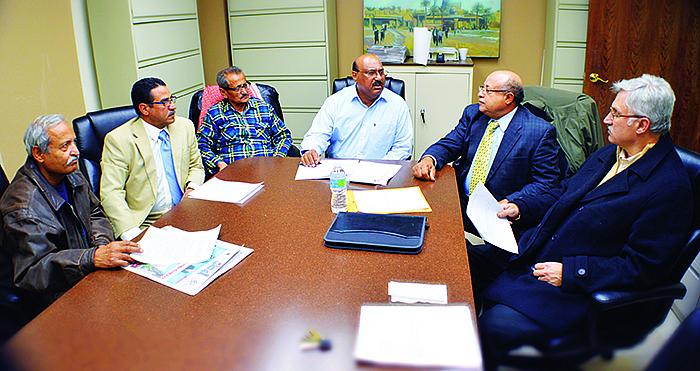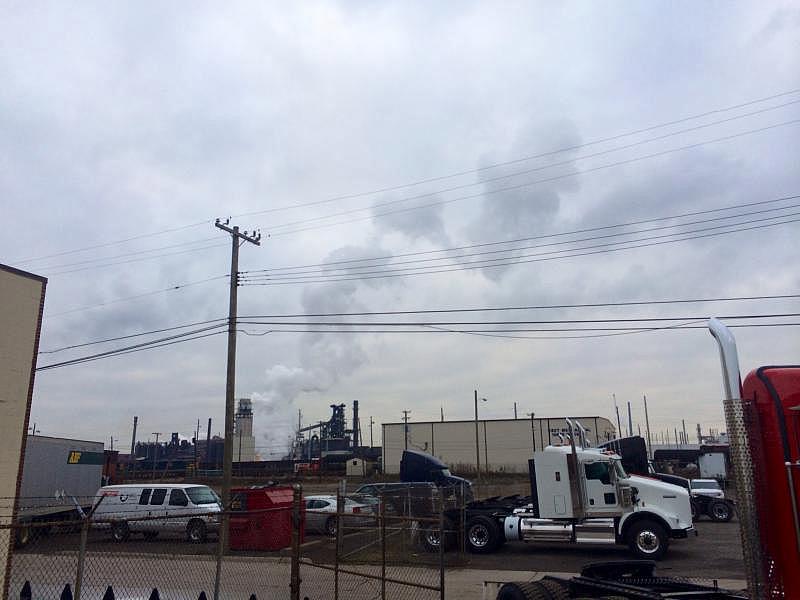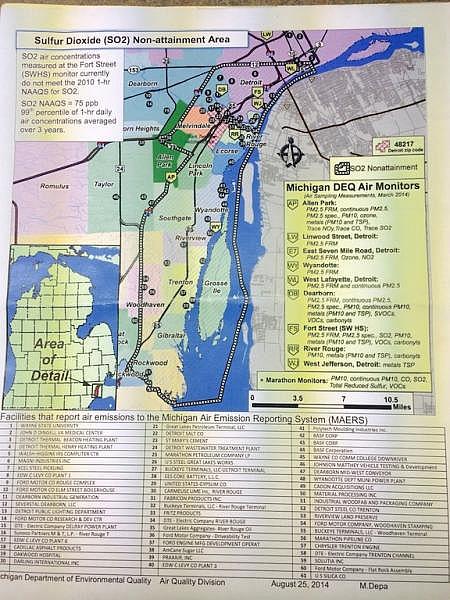Part One: Environmental groups seek to overturn controversial emissions permit
Natasha Dado wrote this series for The Arab American News as a fellow in the 2014 National Health Journalism Fellowship, a program of the USC Annenberg School for Communication and Journalism. Read others parts of this series here:
Part Two: Detroit residents complain of health effects of breathing in toxins
Part Three: Are industrial sources near schools jeopardizing students' health?

(L-R) SDEIA members Hashem Saeed, Ahmed Alwahaishi, Mohamed Saleh, Mohamed Ahmed, Abdo Bapacker and Zouher Abdel-Hak met with The Arab American News on Nov. 15 to discuss the four lawsuits the organization has initiated involving Severstal.
DEARBORN — In May, the Michigan Department of Environmental Quality (MDEQ) issued a controversial revised emissions permit to Severstal, a steel company located in the southend of Dearborn, an area considered to be in non-attainment for sulfur dioxide — which means the level of sulfur dioxide in the air exceeded state and federal standards.
Still, the MDEQ treated the permit as if the area was in attainment for sulfur dioxide and agreed to “grandfather” the permit by applying air pollution laws and rules from 2007 instead of requirements in effect today, according to a pending lawsuit that asks for peremptory reversal of the permit.
If Wayne County Circuit Court Judge Robert Ziolkowski agrees to overturn the permit, it would be immediately sent back to the MDEQ to start over using current requirements, including nonattainment rules for sulfur dioxide.
Lynn Fielder, the MDEQ's air quality division assistant chief, would not comment on the lawsuit when she spoke to The Arab American News in August.
“We can’t talk about the lawsuit...There is litigation going on and we do have an enforcement action going on against Severstal, so we can’t really speak to that permit at this time,” she said. “We issued a permit that was in compliance with state and federal law.”
The sale of Severstal’s Dearborn plant to AK Steel, another multi-billion steel company, was finalized in September, but the purchase does not affect either the lawsuit or the permit, which transfers over to the new company.
The lawsuit was filed in July against the MDEQ and its director, Dan Wyant, by South Dearborn Environmental Improvement Association (SDEIA), a Michigan non-profit Corporation; Detroiters Working for Environmental Justice (DWEJ), a Michigan non-profit corporation; Original United Citizens of Southwest Detroit (OUCSD), a Michigan non-profit corporation; and Sierra Club, a California corporation. The four organizations have members who are residents of the Southend of Dearborn and Southwest Detroit, another area in close proximity of Severstal's former plant.
The permit was issued under heavy objection from residents. Stephanie Karisny, a staff attorney for the Great Lakes Environmental Law Center, is representing the DWEJ, OUCSD and the Sierra Club in the suit. She said that since the permit was approved, the plant was able to release higher pollution levels.
It was reported that under terms of the permit, toxic pollutants such as lead, carbon monoxide and PM10 (fine dust) could be doubled, tripled, quadrupled or even increased by more than 7,200 percent.
According to Christopher Bzdok, an attorney for the law firm Olson, Bzdok and Howard, which is representing SDEIA in the suit, the permit allows the plant to operate at maximum production and needed to be passed in order for Severstal to sell.
“They needed to sell the plant and they needed to tell somebody that they can run this at max,” Bzdok said. “So the answer to the question of ‘are they really raising limits?’ is if they continue to operate at the levels they did when they did the stack test, then no. But if they increase their production or if they have increased their production, then yes, they have increased their actual emissions by a lot.”
Dearborn’s southend borders the infamous 48217 ZIP Code of Southwest Detroit, Michigan's most polluted, according to University of Michigan environmental scientists who have studied air pollution data that also shows neighboring ZIP codes account for five of the other top 10 areas. The 48217 ZIP Code is also in non-attainment for sulfur dioxide and surrounded by refineries and heavy industries.

Severstal’s plant was not the only polluter contributing to the environmental problems in and around southwest Detroit. There are 61 facilities that report air emissions to the Michigan Air Emission Reporting System.
However, Severstal's plant was known as the state's biggest polluter because of past air quality control violations.
“We have been bringing together a lawsuit and it is really hard, because we are a really poor community,” said Vincent Martin, a resident of Southwest Detroit and member of OUCSD, who lives right behind the Marathon Oil Refinery, another major polluter.
Fighting for more than just victory in a lawsuit
Theresa Landrum is a lifelong resident of Southwest Detroit and a member of the OUCSD. For Landrum and many others, the lawsuit is about so much more than the permit. They say they’re fighting for the mothers, fathers, daughters, brothers, sisters, grandparents, friends and neighbors they believe suffered severe— and sometimes fatal— health issues because of dangerous environmental factors.
Landrum’s mother and father both died of lung cancer. Her mother had four different kinds of cancers. Landrum, a cancer survivor herself, gave up her career as a journalist to take care of her parents. Two of her brothers also died, one of them from pneumonia.
“My family has suffered severely,” she said. “My mother and father both died of lung cancer. They want to attribute it to lifestyle or say it is genetics, but a husband and a wife, that is not genetic.”
“Take for instance one family with eight family members,” she said. “They all had cancer of some sort. They lived right here in the 48217, right here on Annabelle [Street]. Then you see a mother with four different cancers, and a husband with cancer. Then their child comes up with cancer. Not one family, but several families in one block.”
Landrum’s father worked at factories in the southend of Dearborn and southwest Detroit.
“All the coke dust, and all the dust going into their bodies, I really think contributed to their health problems,” she said.
SDEIA board member Mohamed Ahmed is a resident of the Southend of Dearborn. Ahmed said he is tired of watching innocent children in his community develop asthma. He believes the issue is a direct correlation to the pollution.
The American Lung Association reported in 2014 that Wayne County has the highest number of pediatric asthma cases in Michigan, along with the highest population in the state living in poverty.
Southwest Detroit has a high African American population and Yemeni Americans account for an overwhelming majority of the Southend residents. Through the lawsuit, African Americans and Arab Americans have come together with the common purpose of fighting for environmental justice.
“We are going to work together,” said Mohamed Saleh, a board member of SDEIA and resident of the Southend for 52-years.
Is the trade-off jobs for life?
Nasser Beydoun is the vice president of multicultural marketing for the Detroit based Bassett and Bassett Communication Managers and Counselors. Since last spring, Beydoun has been working on creating an advisory board of community members from the Southend and neighboring communities to get input on a Supplemental Environmental Project (SEP). A SEP must improve, protect or reduce risks to public health or the environment at large. Fielder said the Environmental Protection Agency and Department of Justice are the main agencies working on the enforcement action against Severstal.
“I was helping Severstal create a community advisory board, create a Supplemental Environmental Project for the community,” Beydoun said. Because of Severstal’s economic impact on Michigan’s economy, Beydoun doubts the group will be able to get the permit reversed in court.
“You cannot put a company like Severstal out of business,” Beydoun said. “It buys a billion dollars a year worth of local goods and services. It employs 1,600 people, many of them from that community, and they are all good paying jobs.”
Severstal purchased the Rouge Steel Plant back in 2004 when it was bankrupt and prevented more than 1,500 people from losing their jobs.
During a public hearing on the permit back in March, employees of Severstal and representatives from unions argued that the permit was necessary to save jobs.
“Is the tradeoff our lives for jobs?” Landrum asked. Saleh has two nephews who worked at Severstal.
"We are not against Severstal because big business or big companies provide jobs, but they have to lower the pollution they put in the air that me and my family, my community and my friends smell and breathe every day,” Saleh said. “We want to make it better, and this new company could make it worse under the new permit."

Air pollution violations hurting communities
Severstal paid about $1 million in fines to the Department of Environment and Natural Resources and spent millions of dollars on new control equipment to settle previous violations in 2006. Attorneys for SDEIA say treating the permit as though the area was in attainment for sulfur dioxide meant Severstal would not have to install expensive equipment to reduce its pollution. In August a toxicologist from the MDEQ told TAAN companies had until 2015 to get in compliance with regulations for sulfur dioxide. Landrum says she is concerned about how long some companies have been out of compliance with air quality control regulations for sulfur dioxide.
“They are going after profit, so therefore the minority communities, the impoverished communities, they are causalities, as I previously said of these corporations' greed,” Landrum said.
Saleh pointed out that when the MDEQ issued the permit it was aware of Severstal's past violations. “Even the concrete, if you get the hose and you clean it, it is all black. We don’t want money. We are not greedy. If the technology is there, use it. We are not against Severstal. We are pro-environment.”
SDEIA has initiated three other lawsuits involving Severstal outside of the one that includes the other three organizations. One is in federal court in Detroit over Severstal’s many violations of its permit and the federal Clean Air Act. SDEIA also filed a lawsuit against Severstal under the Michigan Environmental Protection Act and one against the Michigan Economic Development Corporation (MEDC), governor Rick Snyder's business promoting agency for violating the Freedom of Information Act (FOIA) law.
According to one of the lawsuits, Severstal is a chronic violator of the Clean Air Act and the Michigan Air Pollution Act, with more than 1,000 violations alleged by the MDEQ and the U.S. Environmental Protection Agency in the past four years.
“It (permit) is a violation of the Clean Air Act, but you have to remember where Severstal was when it was the Rouge Steel to where it was when they did the renovations,” Beydoun said. “The retrofitting and cleaning up, and they took a company that was polluting here down to here. It is still pollution and could be cleaned up more and more. More has to be done.”
The group lawsuit accuses MEDC of lobbying the MDEQ to pass the permit after the CEO of Severstal met with Snyder and the director of the MEDC and asked them to intervene in the process of getting the permit passed.
Emails between the MEDC and MDEQ are provided as evidence in the group lawsuit to support the claim. Michael Shore, the communications director for the MEDC, would not comment.
Ahmed said SDEIA doesn’t want anything to come out of the lawsuits except that the company continuing to operate inside the factory stay in compliance with air pollution laws, and be held accountable if any are broken.
The Arab American News (TAAN) contacted AK Steel, Severstal, Brad Wurfel, the communications director for the MDEQ and Bill Noakes, the former director of government relations for Severstal, who now works at AK Steel, but did not receive any response.
In March, Noakes, who attended a public hearing regarding the permit, told TAAN Severstal had been in a rigorous test mode throughout the last few years regarding pollutants and that the overall level of pollution from Severstal was going to be significantly reduced from what it was in 2004- 2006.
"As you know, these two communities, the Southend of Dearborn and the 48217 ZIP code of southwest Detroit, are the two most burdened communities with air pollution in the state of Michigan,” Bzdok said. “No question about that. They are also communities where every time studies have been done, they have high rates of illnesses that correlate with environmental factors as well as starting with asthma and going down from there. They say— and I think rightfully so— we are American citizens, we have a right. These are our properties, this is our home and we have a right to not be poisoned slowly on an ongoing basis by pollution from this facility and others. There are a lot of sources of pollution for those neighborhoods, but Severstal is unquestionably the worst. They are the worst because they violate the most."
The motion for peremptory reversal is expected be heard in December 16 at 2 p.m.
This story was originally published in The Arab American News

